OFFSHORE SAFETY
Warnings from the past — interview with a survivor from one of the most catastrophic oil rig disasters in history
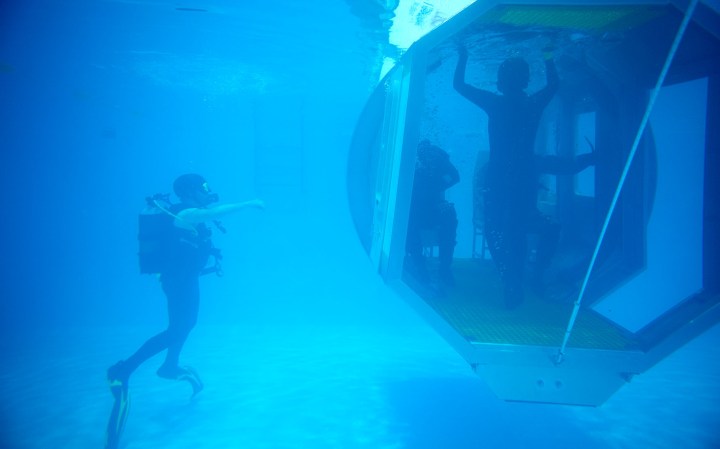
Joe Meanen’s account underscores the need for greater accountability and prioritisation of health and safety in offshore operations.
The environmental toll of oil and gas exploration is often in the spotlight, but what about the human toll of these activities? A survivor from the 1988 Piper Alpha disaster in Scotland, which shook the world, claiming 167 lives reveals the trauma he carries to this day. This is his story …and his warning.
“After I got into the sea, I got picked up in a lifeboat and, looking back at the platform, it was just explosions going off all the time. I was just thinking, well if anybody else was left on that platform, they’re dead. They’ve got no chance of surviving,” said Joe Meanen, one of the survivors.
Meanen knows the horror first-hand and recounted the harrowing events in an interview with Daily Maverick. The Piper Alpha, an oil rig situated off Aberdeen, was home to more than 200 men at the time. On 6 July 1988, a gas leak caused a huge explosion that sent a fireball ripping through the platform.
“I was on the Piper Alpha platform when it blew up in the North Sea back in 1988. I was working offshore for eight years [at the time] and my job was a scaffolder offshore, working two weeks on and two weeks off.
“It [the explosions] happened on a Wednesday… We finished our shift at 9pm, and it was 10pm when the first explosion happened. We went to the cinema on the platform to watch a movie… and about 45 minutes into watching Caddyshack, the first explosion happened…. then it subsided a bit and the whole cinema was silent,” he said.
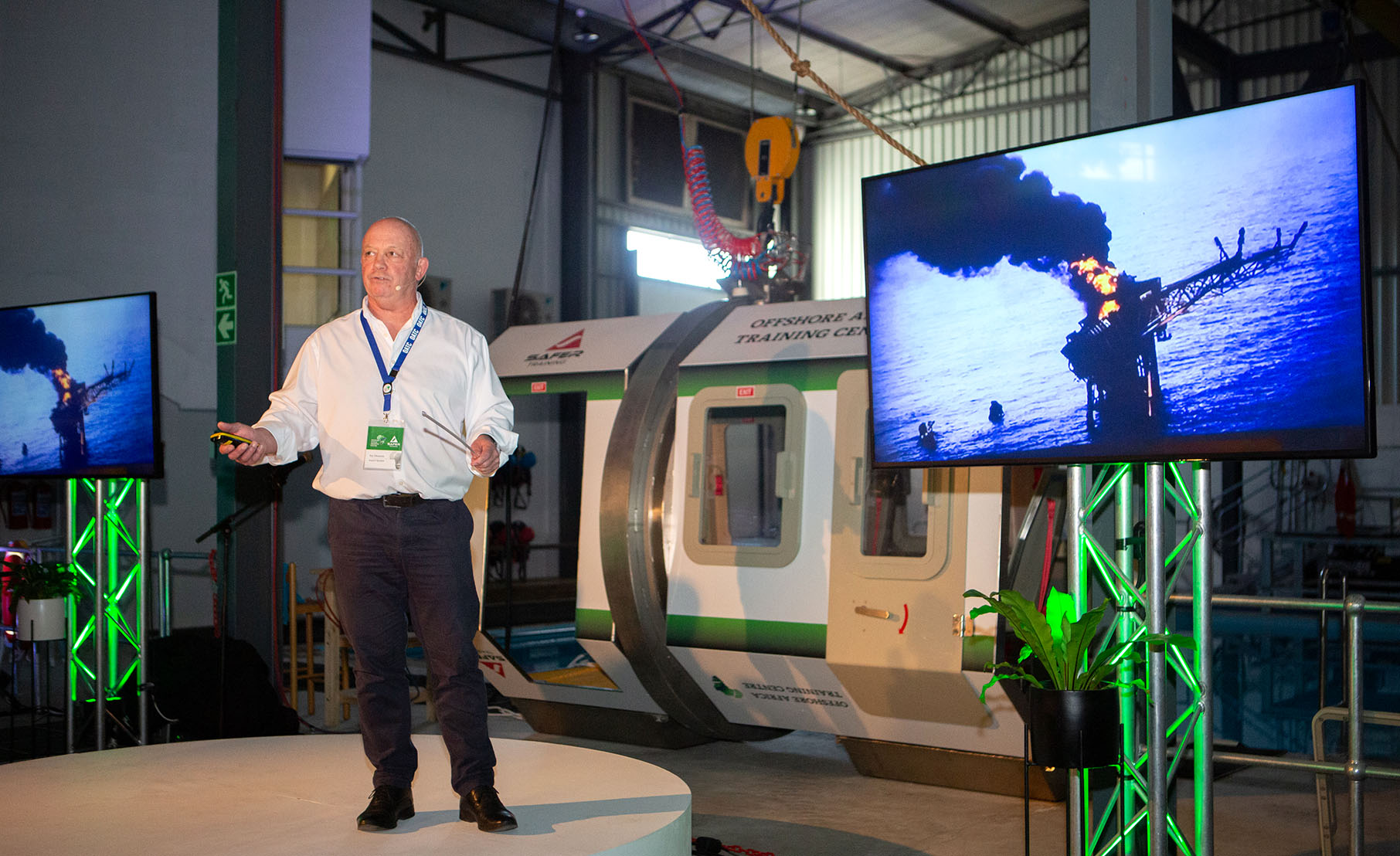
Joe Meanen at the launch of the Offshore Africa Training Centre in Cape Town on 22 February 2024. (Photo: Gallo Images / Misha Jordaan)
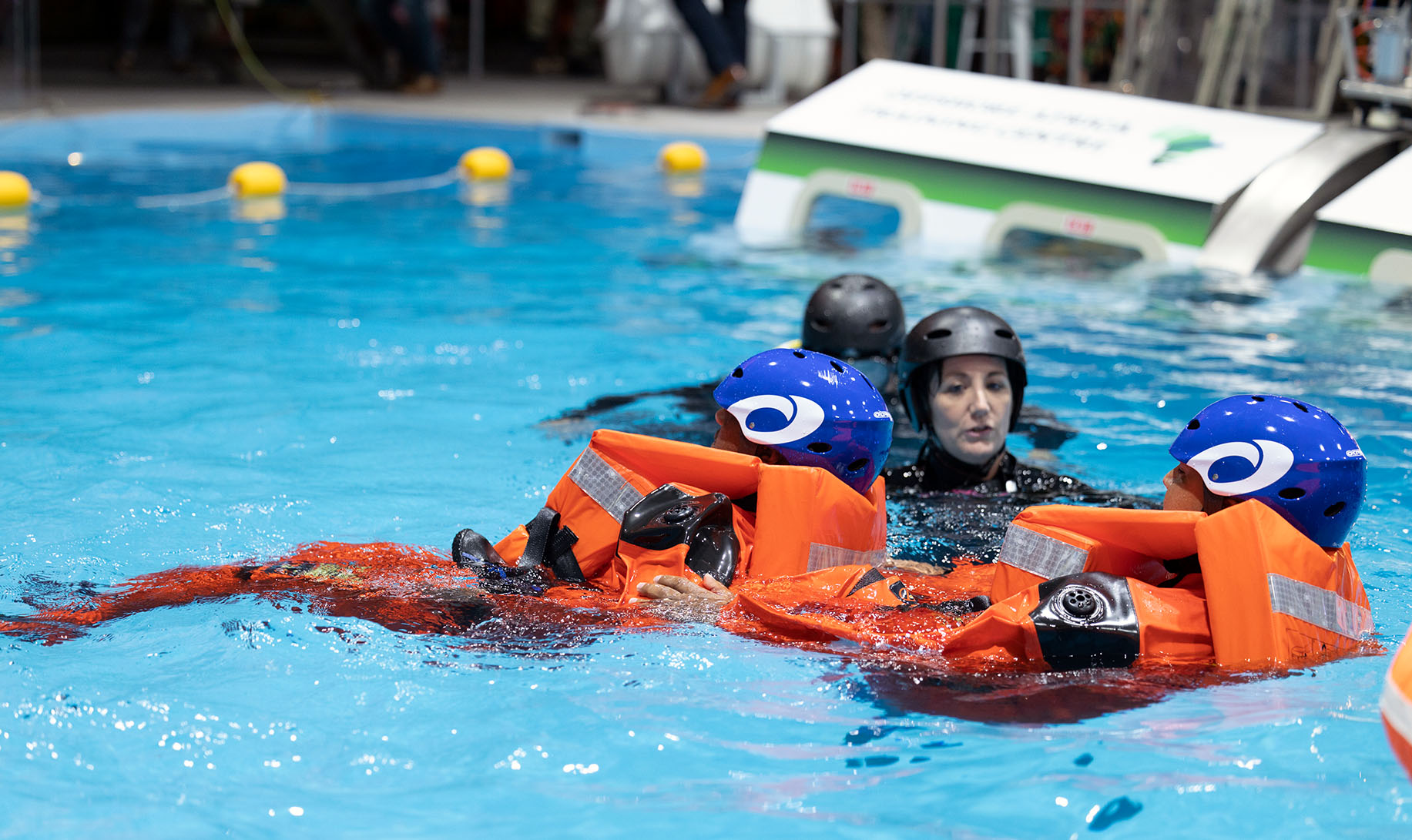
A training demonstration at the Offshore Africa Training Centre in Cape Town on 22 February 2024. (Photo: Gallo Images / Misha Jordaan)
It started up again a minute or so later and “you could feel the energy through your feet and seat, 10 maybe 20 times more excessive. Then all of a sudden there was another huge explosion.”
This happened when a big 32cm pipe that carried gas eventually melted and fractured. The gas ignited and set fire to the entire platform.
“It rocked the platform back and forward, the roof of the cinema fell in, people fell out of their seats and it was pitch-black in the cinema. There was a lot of panic and screaming with people trying to get out,” he said.
Not knowing what to do, Meanen said that he and some other workers made their way to the helideck.
“I was up and near the helideck on the platform, and we got outside but got caught in the explosion… we were initially injured from that but then we all escaped in different ways. We jumped off the platform into the sea.
“I was quite badly burned.” Burns to Meanen’s face were superficial, but he was unable to use his hands and arms as they suffered the most and had to be in casts for months after the incident.
Of the 167 men who died in the Piper Alpha disaster, 16 were recovered from the surface of the sea, 38 from the sea bed and 81 from the accommodation/galley. Thirty bodies were never recovered. Two men from the Sandhaven fast rescue craft also died.
Burns from a fiery hell
“The physical injuries were quite hard to get over… I know a lot of the men who escaped didn’t get physically injured, but they suffered badly with post-traumatic stress disorder. Maybe, as a consequence of not being physically injured, they couldn’t understand or accept how they managed to escape almost injury-free,” Meanen said.
“I was fairly fortunate that I didn’t suffer too badly from post-traumatic stress, but I kind of made a conscious decision not to let it bother me too much.
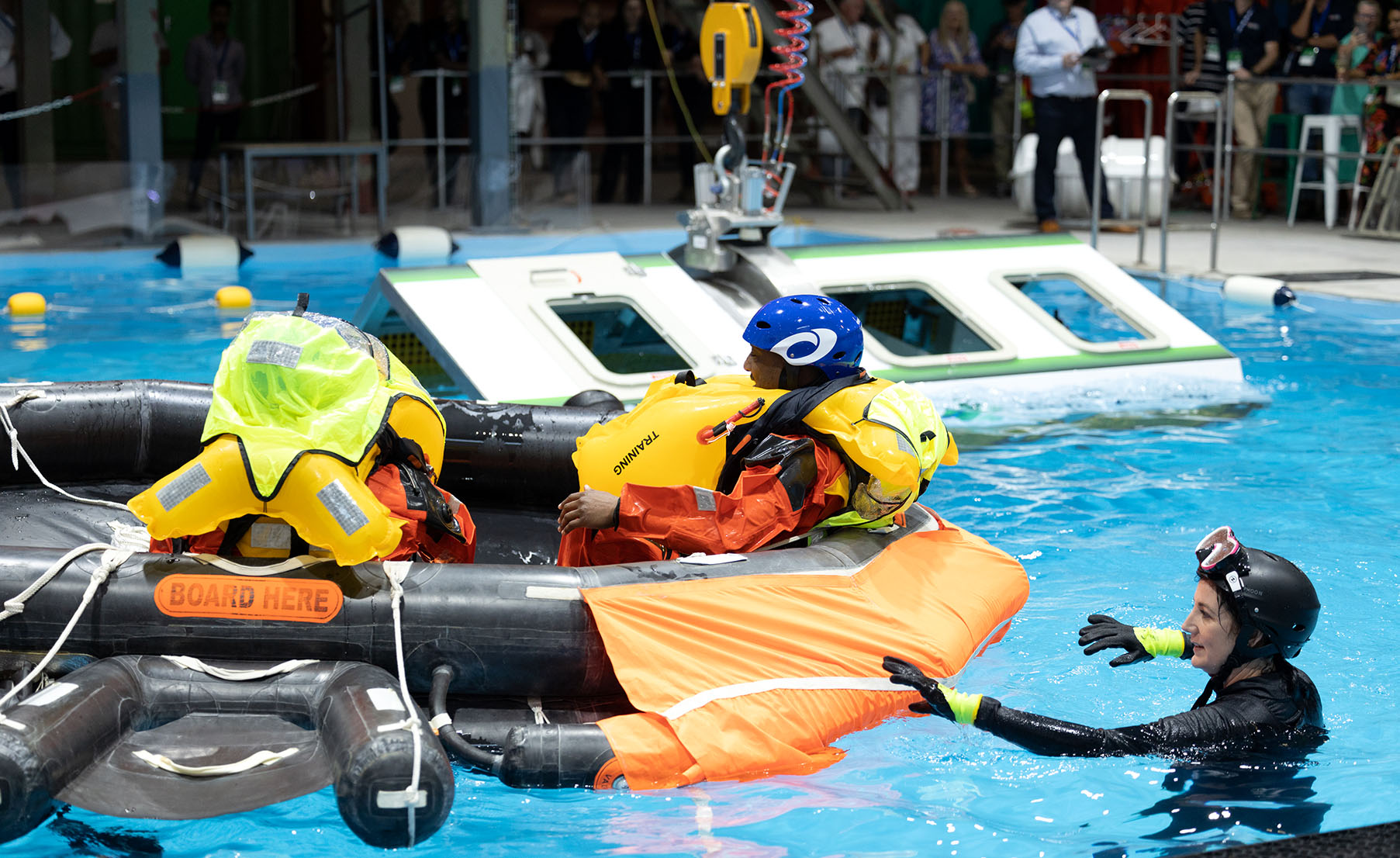
One of the training demonstrations at the new Offshore Africa Training Centre in Cape Town on 22 February 2024. (Photo: Gallo Images / Misha Jordaan)
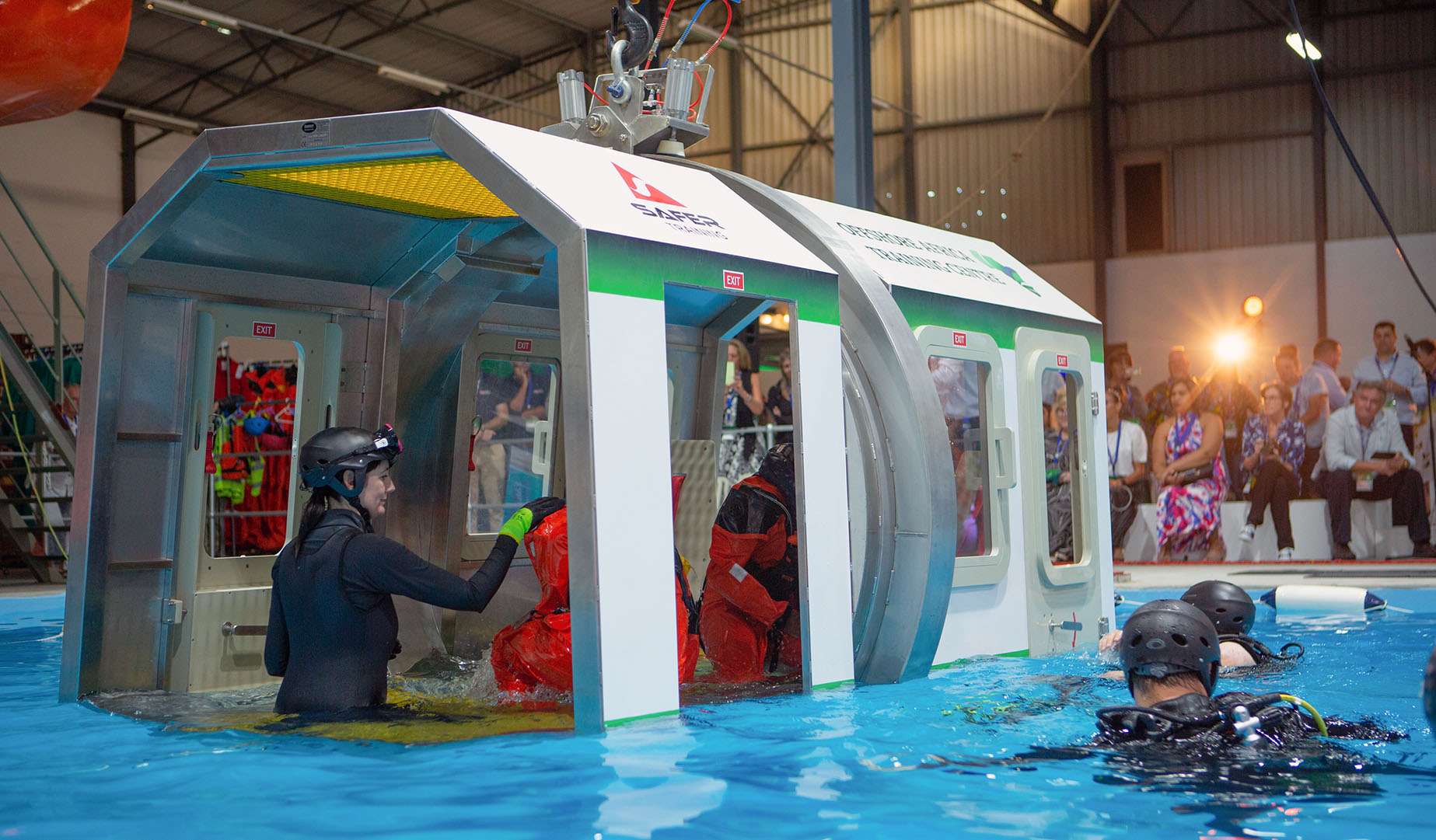
A training demonstration at the Offshore Africa Training Centre that centred on underwater helicopter escape. (Photo: Gallo Images / Misha Jordaan)
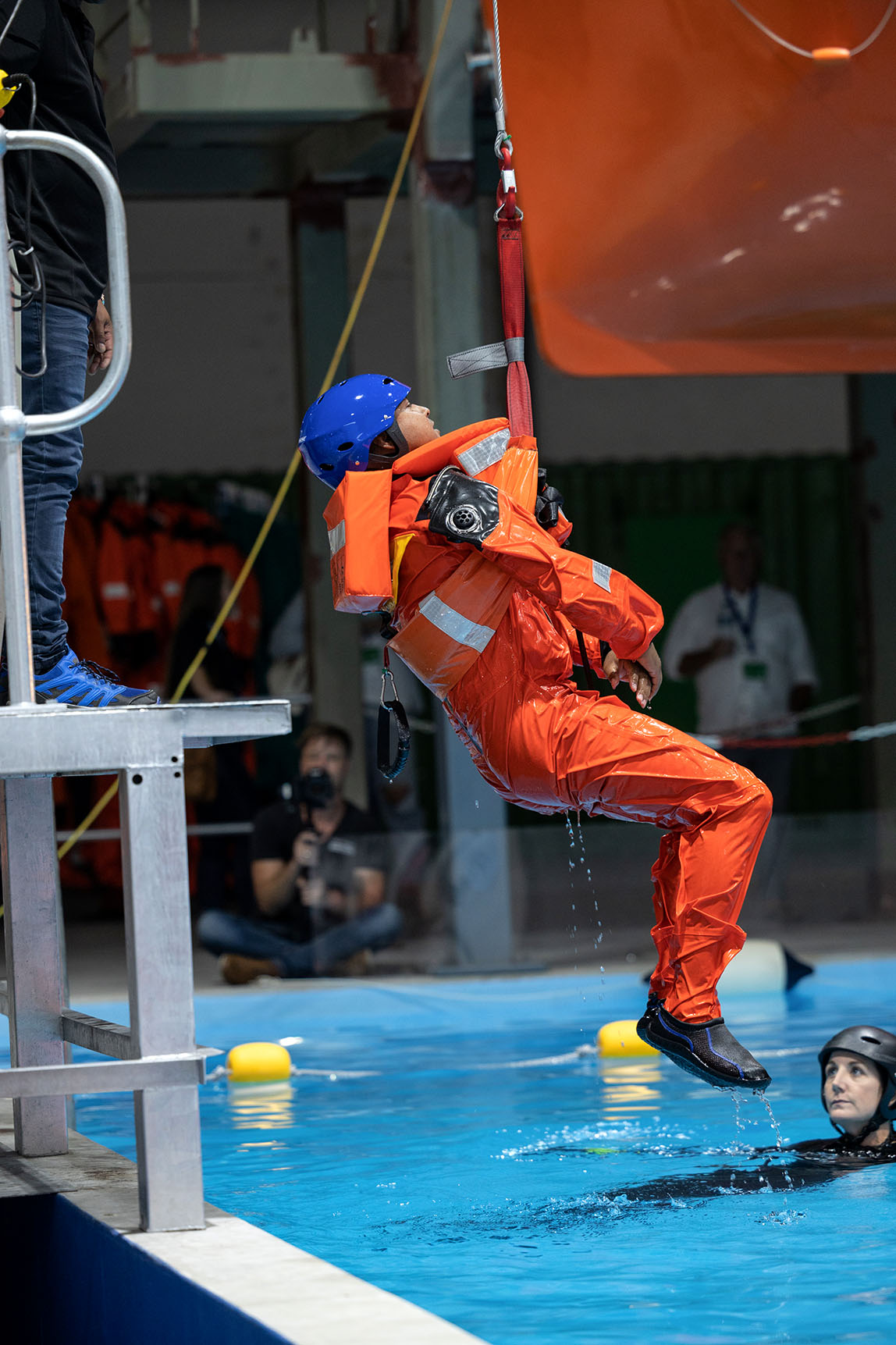
A trainee takes part in a demonstration at the Offshore Africa Training Centre on 22 February 2024. (Photo: Gallo Images / Misha Jordaan)
“I was very angry to a certain extent, but you cannot hold that anger too much or let it manifest in you because it could drag you down… I know a number of the other survivors went along that lane, and some of the parents of the deceased tried to fight all the way, but it took over their lives, which was understandable.”
Meanen’s story underscores the importance of advocating for greater accountability and prioritisation of safety in offshore operations.
Oil and gas exploration in South Africa
South Africa’s seas are predicted to host increasing numbers of drill ships and floating production storage and offloading units in the coming years, despite concerns from a number of bodies about the impact on the environment, lives and livelihoods.
But the oil and gas industry is pushing ahead, with the drilling industry considered one of the most hazardous industries to work in. Potential accidents range from working in extreme weather conditions, slips and crush injuries, to environmental hazards such as fires, chemical spills and explosions.
Without proper training and safety measures things can very easily go wrong – as shown by Meanen’s story and work by the Offshore Africa Training Centre (OATC) in Cape Town – making it even more critical for health and safety in these activities to be at the forefront of operations.
Read more in Daily Maverick: Stop oil and gas exploration madness, SA scientists urge government
Meanen was one of the speakers at a new survival training course launched by OATC for its 10th anniversary in Cape Town in February 2024.
At the event, stakeholders in the industry said the need for the safe and responsible exploration of natural gas options was even more important in South Africa today as exploration ramps up and new fields are discovered.
OATC chief executive Gary Concar said this growth would lead to increased demand for internationally approved energy sector workforce members, especially professionals trained according to rigorous international safety standards.
The OATC facility is the first in South Africa to offer global Offshore Petroleum Industry Training Organisation (Opito) accredited training, with courses covering rigging, lifting, slinging, banksman duties, lifting operations and lifting equipment regulations, as well as the new Opito Survival Courses (BOSIET CA-EBS).
The courses service a wide range of sectors involved in the offshore and renewable sectors.
In an interview with Daily Maverick, Concar said he quit working in the offshore industry as a rigger after 20 years to open OATC in 2013, modelled after what he had dreamed of while working offshore.
“When I used to work offshore, I used to have to go to Angola for four weeks, then the UK for four weeks for training courses, and then back to Angola for four weeks and then come home every year. So it was 12 weeks straight a year. I would miss home and family.
“Now we have the privilege of being the first centre in South Africa to get Opito-accredited training (international approval)… If you want to work internationally in the offshore and gas industry, you need the Opito approval… then deeming you competent as a qualified rigger for the offshore oil and gas,” he said.
Concar added that a critical component was helicopter underwater escape training because most people travel from shore to the platform by helicopter.
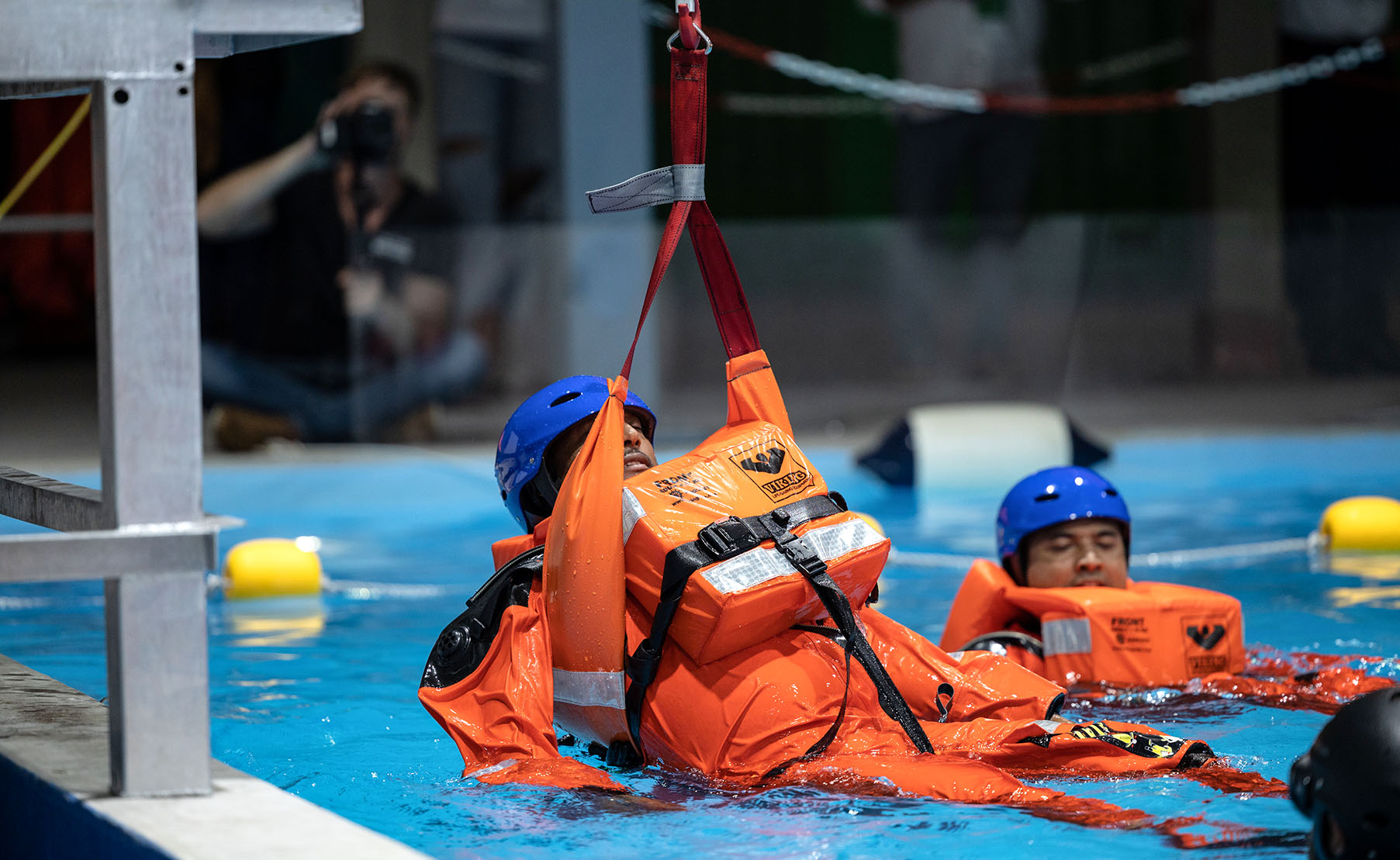
The Offshore Africa Training Centre was launched in Cape Town on 22 February 2024. (Photo: Gallo Images / Misha Jordaan)
Offshore safety training in South Africa
Kirsty Minton, lead instructor for the BOSIET offshore course at OATC, has been teaching in the industry for 15 years, with a background as a rescue paramedic. Minton echoed that safety was important, especially in South Africa, and that they haven’t had any major incidents yet.
“There have been one or two incidents where there was a small fire on board and they were able to contain it, and they evacuated non-personnel via helicopters. But we haven’t really had anything major… a couple of guys have said that they have to use our first aid training. Other than that, we’ve been very lucky in South Africa so far,” she said.
“Being a paramedic and having been in all these emergency situations, I’ve seen how people who have not had any training can fall apart. That’s just based on adrenaline and the frontal lobe shutting down. But it does show that if you’ve done your training, if you’ve done orientation, your chances of survival are so much better than if you’ve done nothing.”
During the survival training course in Cape Town, Minton explained two demonstrations of their training – helicopter underwater safety (for both controlled and uncontrolled ditchings), and how personnel could escape from their installation offshore.
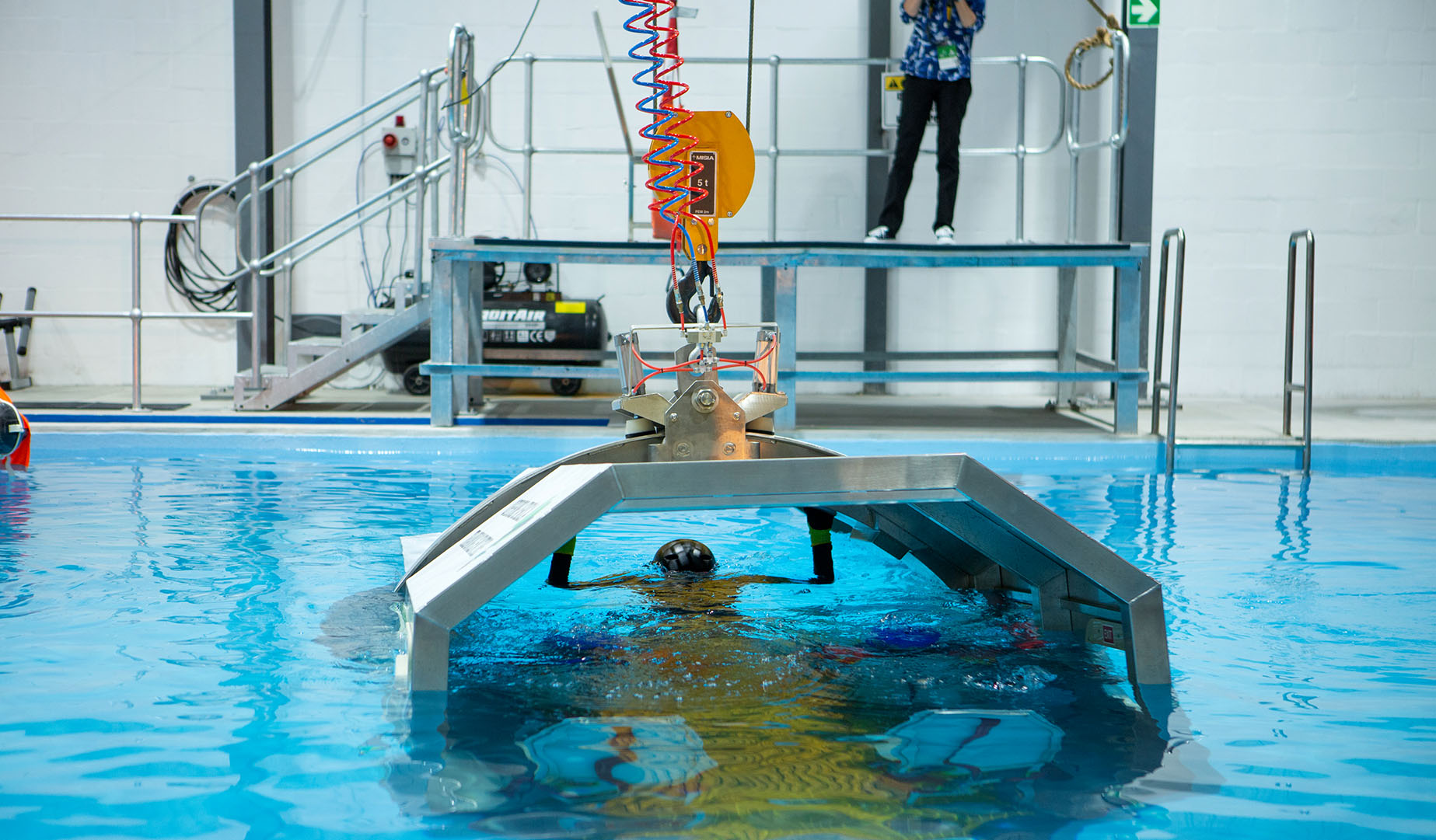
Underwater escape training demonstrated at the Offshore Africa Training Centre on 22 February. (Photo: Gallo Images / Misha Jordaan)
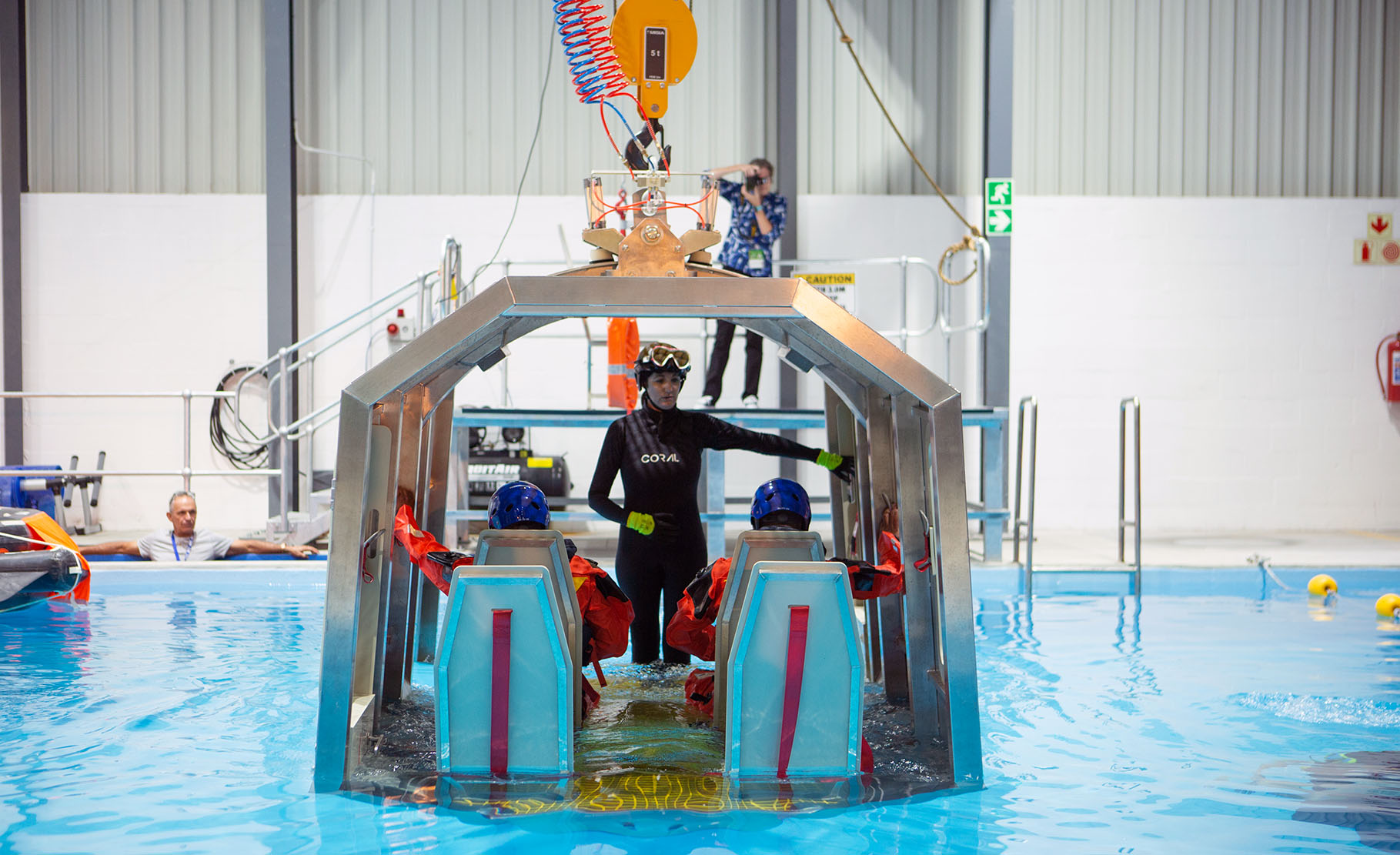
Trainees are instructed at the Offshore Africa Training Centre. (Photo: Gallo Images / Misha Jordaan)
“Helicopters are the primary mode of transportation to and from the oil rigs, from the installations they’re working on. So it’s really important that the guys know what to do in the event of emergency ditching. They’re primarily flying over the ocean so it’s even more important that they know what to do should they ditch into the ocean.
“For controlled ditchings we teach the guys how to evacuate out of the helicopter, open up the windows and escape into an aviation life raft, as well as how to deploy those rafts.
“The second type of ditchings are uncontrolled ditchings, so they just kind of drop out of the sky and hit the water. Two-thirds of all helicopters invert and sink, so the second demonstration we did was the helicopter hitting the water, sinking and inverting and then how to access their seat belts, open the windows, egress safely out of the helicopter, group up together, deploy their spray visors to protect their airways and then make their way over to the heli raft,” she said.
Transformed safety regulations
Since the incident in 1988, Meanen said, risk assessments and safety regulations have changed enormously, and there was a public inquiry by Honourable Lord Cullen, a senator at the College of Justice in Scotland.
The inquiry sought to establish the circumstances of the incident and its cause, and make recommendations to avoid similar incidents in the future.
According to the inquiry, the disaster was the result of a series of events which were set in motion by the initial explosion, which also destroyed or disabled the active fire protection system.
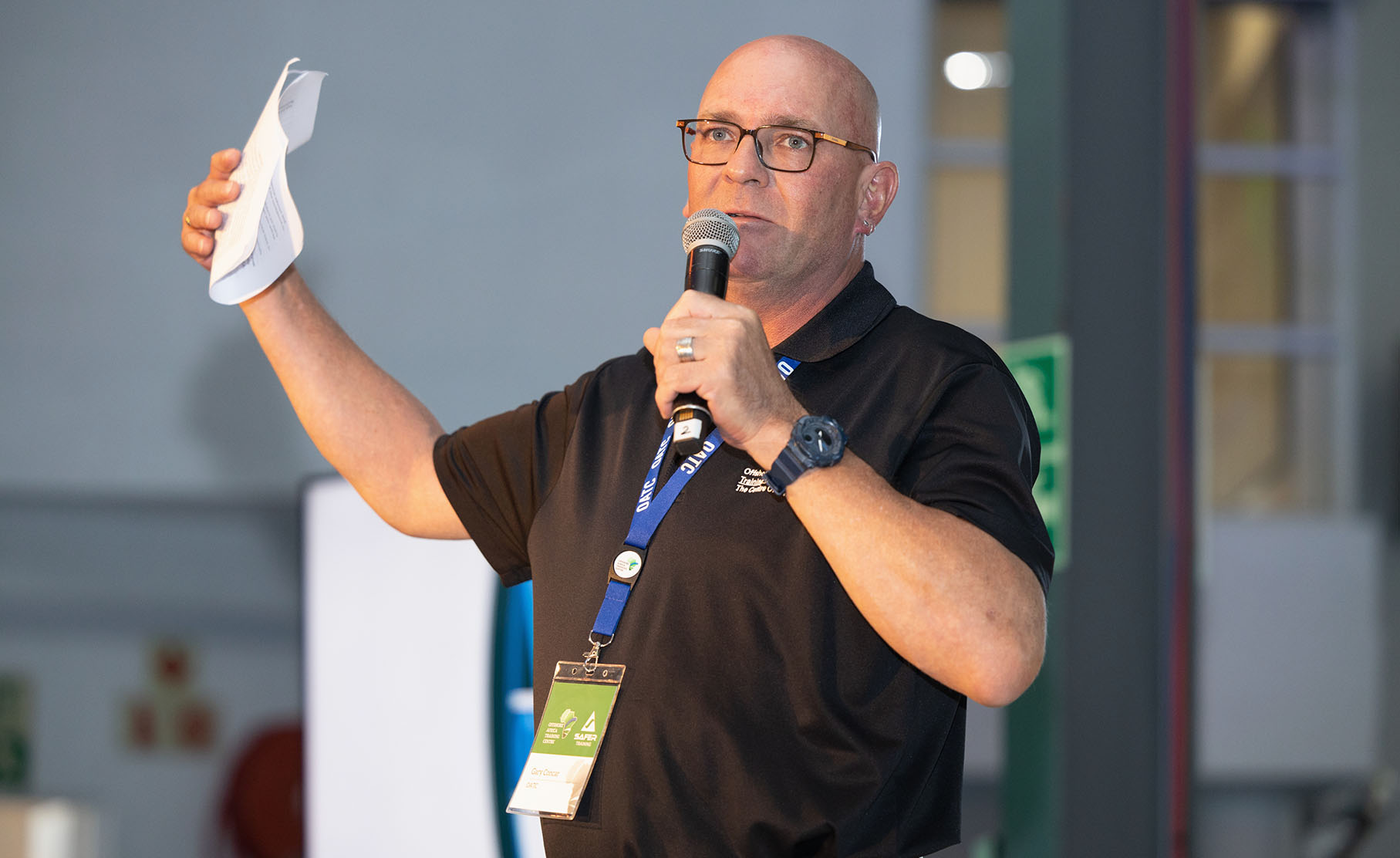
OATC chief executive Gary Concar at the launch of the Offshore Africa Training Centre in Cape Town on 22 February 2024. (Photo: Gallo Images / Misha Jordaan)
Those events included a crude oil fire which generated heat and dense black smoke which engulfed the accommodation from the outset; a series of explosions; and massive and prolonged fires fuelled by gas under high pressure following the ruptures of the gas risers.
Lord Cullen’s report produced 106 recommendations in 24 different areas, all of which were adopted by the government and industry, subsequently transforming offshore regulation and operations around the world.
He said the most important recommendation was to move responsibility for offshore health and safety from the Department of Energy (conflict of interest) to the Health and Safety Executive (HSE).
“If it wasn’t for the tragedy of Piper Alpha and the sacrifice of 167 lives lost on that night, who knows how long things would have carried on as they were in the North Sea oil industry,” Meanen said.
Meanen has been a safety speaker for eight years, hoping to make a difference and make people more aware of what could happen.
“The industry took all the recommendations on board, but there is always going to be a challenge getting the message over. It’s such a dangerous business, and if things do go badly wrong they can escalate quite quickly. DM



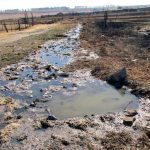












 Become an Insider
Become an Insider
A very worthwhile and well written article and description of the dangers of working environment in offshore oil & gas & renewable industry. There is no abundance in stressing the importance of accredited traing and qualified trainers to help improve the chances of surival in emergency situations. Kudos to all involved in making this article!